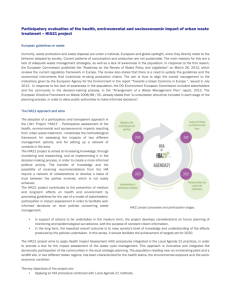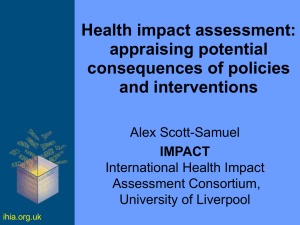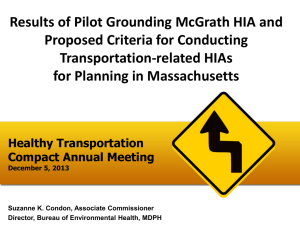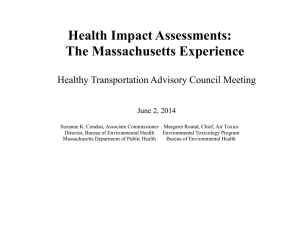McGrath Highway Project Health Impact Assessment Healthy Transportation
advertisement
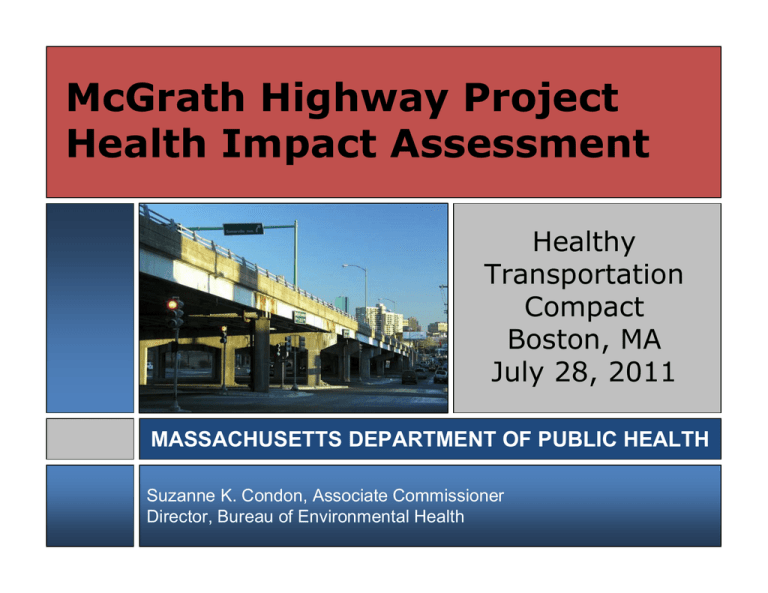
McGrath Highway Project Health Impact Assessment Healthy Transportation Compact Boston, MA July 28, 2011 MASSACHUSETTS DEPARTMENT OF PUBLIC HEALTH Suzanne K. Condon, Associate Commissioner Director, Bureau of Environmental Health 1 Outline I. Introduction II. Background on “Grounding McGrath” Study III. Incorporating HIA Into the Decision Making Process IV. Example of Baseline Health Data for Consideration in HIA V. Timeline for “Grounding McGrath” HIA VI. Overall Goal to Meet HIA Directives of Transportation Reform VII. Questions 2 I. Introduction • Under M.G.L. Chapter 6C, Section 33 the Healthy Transportation Compact is directed to: – (v) establish methods to implement the use of health impact assessments (HIAs) to determine the effect of transportation projects on public health and vulnerable populations; and – (x) institute a health impact assessment for use by planners, transportation administrators, public health administrators and developers. • Transportation planning projects often have a range of health implications that are not uniformly considered • MDPH was awarded funds from the RWJ/Pew Health Impact Project to conduct a transportationrelated HIA 3 II. Background on “Grounding McGrath” Study • Project underway by the MassDOT that the HIA will inform is “Grounding McGrath” Study in Somerville, MA – Overall this transportation project aims to determine the future of the Route 28 corridor – MassDOT indicated that the size of the investment necessary to restore the highway provided an opportunity to evaluate the feasibility, benefits, impacts, and costs of removing at least a portion of the elevated structure on Route 28/McGrath Highway – MassDOT’s existing study protocol lends uniquely to the HIA process including establishment of an Advisory Group composed of community representatives to evaluate alternatives 4 5 6 7 III. Incorporating HIA Into the Decision Making Process • The HIA will provide supplemental health data analyses to augment the “Grounding McGrath” Study to promote decision making for optimal transportation design – The HIA work at MDPH is a collaborative effort between the Bureau of Environmental Health and Bureau of Community Health and Prevention – Various alternatives will be considered in terms of the future of Route 28 but in addition to feasibility, benefits, impacts, and costs, health will become a component of the final decision – The health assessment will use existing health surveillance data at the highest geographical resolution possible (e.g., neighborhood level data) – The community surrounding Route 28 is also designated as an Environmental Justice community. Hence, socioeconomic factors including income, housing 8 availability/costs, and access to medical care are important factors that should be considered in the baseline health IV. Examples of Baseline Health Data for Consideration in HIA Health Determinants Health Outcomes Data Sources Air pollution – high gradient near roadways and scientific evidence that continues to emerge regarding health impacts Respiratory disease/illness (e.g., asthma), cardiovascular disease (e.g. heart attack), all-cause mortality, certain cancers MDPH Bureau of Environmental Environmental Health Public Health Tracking (EPHT) Portal http://matracking.ehs.state.ma.us/ Access to active transportation and increasing physical activity – (e.g., access to sidewalks, bicycle paths) Access to public transit mobility for vulnerable populations (people with disabilites, elderly) Benefits for reducing obesity, MDPH Bureau of Community diabetes, cardiovascular disease, Health and Prevention premature mortality, improved mental and physical health Access to goods/services that support MassDOT health, such as groceries, clinics Traffic Safety Injury to pedestrians, vehicle drivers, MassDOT and cyclists Economic: vitality of small businesses; property values and health care costs that could be reduced based on HIA outcomes Environmental Justice Multiple indirect impacts on health Economist to be hired Multiple indirect impacts on health EEA/MDPH EPHT/MassDOT 9 V. Timeline For “Grounding McGrath” HIA Screening Identify projects or policies for which an HIA would be useful Scoping Determines which health impacts to evaluate, methods for analysis, and a workplan Assessment Provides: 1) a profile of existing health conditions 2) evaluation of potential health impacts Recommendations Provide strategies to manage identified adverse health impacts Reporting Includes: 1) a final HIA report 2) communication of findings & recommendations Monitoring Tracks: 1) impacts on decision-making processes and the decision 2) impacts of the decision on health determinants Complete October 2011 September 2011 – January 2012 Spring 2012 Fall 2012 December 2012 10 VI. Overall Goal to Meet HIA Directives of Transportation Reform • The goal of the proposed transportation-related HIA project is to work together with MassDOT, EEA and other community representatives to: – pilot an HIA of a proposed transportation-related project – serve as a vehicle for training staff responsible for implementing the HIA directives – provide the framework for developing methods to determine which types of transportation projects might benefit from an HIA and the process to make such determinations 11 VII. Questions 12



